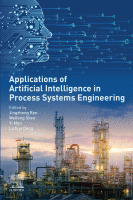Browse content
Table of contents
Actions for selected chapters
- Full text access
- Book chapterAbstract only
Chapter 1 - Artificial intelligence in process systems engineering
Tao Shi, Ao Yang, ... Yi Man
Pages 1-10 - Book chapterAbstract only
Chapter 2 - Deep learning in QSPR modeling for the prediction of critical properties
Yang Su and Weifeng Shen
Pages 11-37 - Book chapterAbstract only
Chapter 3 - Predictive deep learning models for environmental properties
Zihao Wang and Weifeng Shen
Pages 39-66 - Book chapterAbstract only
Chapter 4 - Automated extraction of molecular features in machine learning-based environmental property prediction
Zihao Wang and Weifeng Shen
Pages 67-92 - Book chapterAbstract only
Chapter 5 - Intelligent approaches to forecast the chemical property: Case study in papermaking process
Yang Zhang, Jigeng Li, ... Yi Man
Pages 93-118 - Book chapterAbstract only
Chapter 6 - Machine learning-based energy consumption forecasting model for process industry—Hybrid PSO-LSSVM algorithm electricity consumption forecasting model for papermaking process
Yi Man, Yusha Hu, ... Mengna Hong
Pages 119-142 - Book chapterAbstract only
Chapter 7 - Artificial intelligence algorithm application in wastewater treatment plants: Case study for COD load prediction
Zifei Wang and Yi Man
Pages 143-164 - Book chapterAbstract only
Chapter 8 - Application of machine learning algorithms to predict the performance of coal gasification process
Zeynep Ceylan and Selim Ceylan
Pages 165-186 - Book chapterAbstract only
Chapter 9 - Artificial neural network and its applications: Unraveling the efficiency for hydrogen production
Sushreeta Paul, Vijay Kumar and Priyanka Jha
Pages 187-206 - Book chapterAbstract only
Chapter 10 - Fault diagnosis in industrial processes based on predictive and descriptive machine learning methods
Ahmed Ragab, Mohamed El Koujok, ... Mouloud Amazouz
Pages 207-254 - Book chapterAbstract only
Chapter 11 - Application of artificial intelligence in modeling, control, and fault diagnosis
Mohsen Hadian, Seyed Mohammad Ebrahimi Saryazdi, ... Masoud Babaei
Pages 255-323 - Book chapterAbstract only
Chapter 12 - Integrated machine learning framework for computer-aided chemical product design
Qilei Liu, Haitao Mao, ... Jian Du
Pages 325-359 - Book chapterAbstract only
Chapter 13 - Machine learning methods in drug delivery
Rania M. Hathout
Pages 361-380 - Book chapterAbstract only
Chapter 14 - On the robust and stable flowshop scheduling under stochastic and dynamic disruptions
Zhaolong Yang, Fuqiang Li and Feng Liu
Pages 381-416 - Book chapterAbstract only
Chapter 15 - Bi-level model reductions for multiscale stochastic optimization of cooling water system
Qiping Zhu and Chang He
Pages 417-445 - Book chapterAbstract only
Chapter 16 - Artificial intelligence algorithm-based multi-objective optimization model of flexible flow shop smart scheduling
Huanhuan Zhang, Jigeng Li, ... Yi Man
Pages 447-472 - Book chapterAbstract only
Chapter 17 - Machine learning-based intermittent equipment scheduling model for flexible production process
Zifei Wang and Yi Man
Pages 473-495 - Book chapterAbstract only
Chapter 18 - Artificial intelligence algorithms for proactive dynamic vehicle routing problem
Xianlong Ge and Yuanzhi Jin
Pages 497-522
About the book
Description
Applications of Artificial Intelligence in Process Systems Engineering offers a broad perspective on the issues related to artificial intelligence technologies and their applications in chemical and process engineering. The book comprehensively introduces the methodology and applications of AI technologies in process systems engineering, making it an indispensable reference for researchers and students. As chemical processes and systems are usually non-linear and complex, thus making it challenging to apply AI methods and technologies, this book is an ideal resource on emerging areas such as cloud computing, big data, the industrial Internet of Things and deep learning.
With process systems engineering's potential to become one of the driving forces for the development of AI technologies, this book covers all the right bases.
Applications of Artificial Intelligence in Process Systems Engineering offers a broad perspective on the issues related to artificial intelligence technologies and their applications in chemical and process engineering. The book comprehensively introduces the methodology and applications of AI technologies in process systems engineering, making it an indispensable reference for researchers and students. As chemical processes and systems are usually non-linear and complex, thus making it challenging to apply AI methods and technologies, this book is an ideal resource on emerging areas such as cloud computing, big data, the industrial Internet of Things and deep learning.
With process systems engineering's potential to become one of the driving forces for the development of AI technologies, this book covers all the right bases.
Key Features
- Explains the concept of machine learning, deep learning and state-of-the-art intelligent algorithms
- Discusses AI-based applications in process modeling and simulation, process integration and optimization, process control, and fault detection and diagnosis
- Gives direction to future development trends of AI technologies in chemical and process engineering
- Explains the concept of machine learning, deep learning and state-of-the-art intelligent algorithms
- Discusses AI-based applications in process modeling and simulation, process integration and optimization, process control, and fault detection and diagnosis
- Gives direction to future development trends of AI technologies in chemical and process engineering
Details
ISBN
978-0-12-821092-5
Language
English
Published
2021
Copyright
Copyright © 2021 Elsevier Inc. All rights reserved.
Imprint
Elsevier
